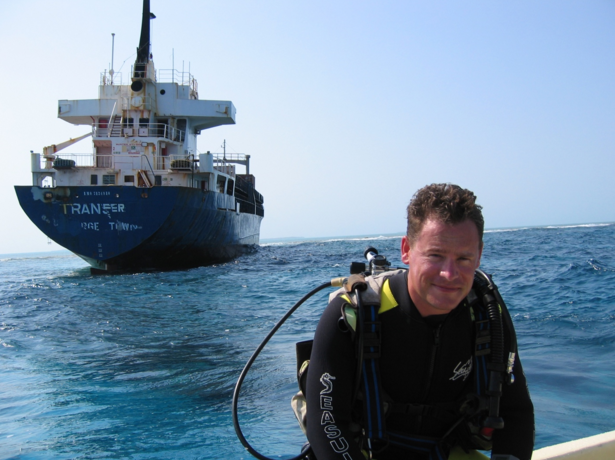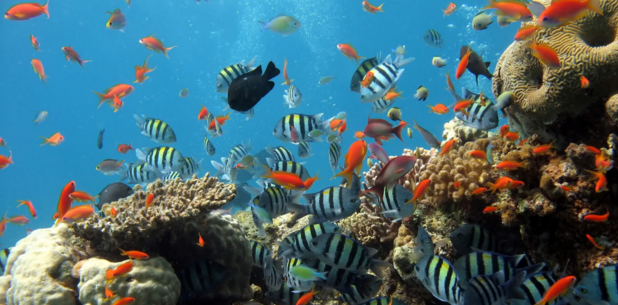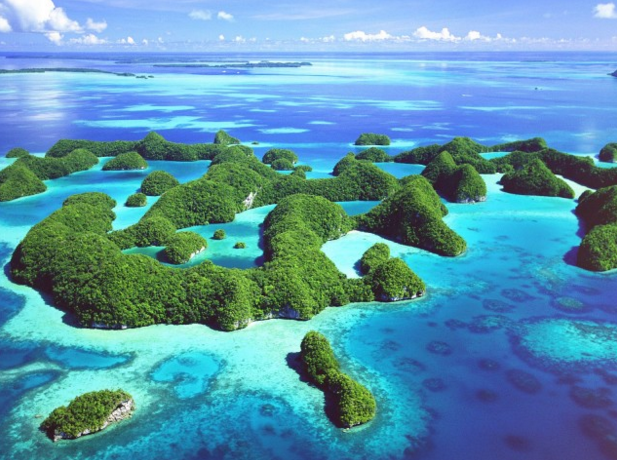
Delivering science to manage coral reefs: an interview with Professor Peter Mumby
“When I was studying marine biology people told me, ‘You shouldn’t do that; there are no jobs,’” says Professor Peter Mumby. “And that’s absolute nonsense. When you reflect on all of the things that still need to be done to protect ecosystems, there are jobs for everybody for a long time to come.”
Fortunately, Mumby wasn’t deterred because his research now delivers information to improve coral reef management from the Caribbean to the Great Barrier Reef. In this interview, the University of Queensland Professor stresses that the only real ‘secrets’ to success are to be generous, volunteer and create the right opportunities.
What drew you to the marine environment and its conservation?
I wanted to be the marine biologist in the film ‘Jaws.’ Jaws has this polarising effect on people; there are those that never want to get in the water and those that want to go swim with sharks. I wanted to become a shark researcher so I learned everything there was to know about sharks and wrote to shark researchers asking, “How do I get to be like you?” I was about twelve.

Caribbean reef sharks.
When I was an undergraduate, I got an opportunity to go on an expedition to Belize which surveyed reefs to inform the development of marine protected areas. After a month I thought, ‘This is me.’ When I finished my degree in marine biology I went back to work for that organisation for two years, helping with surveys and implementation of protected areas and seeing how government works. But what struck me was how little science there was to guide the process. So I went back into academia to do more science to help improve conservation planning.

Credit: Sonia Bejarano
You became a professor very early in your career. Is there anything you attribute that to?
I’ve had good opportunities. When I was at school, I was fortunate to have a job working at an aquarium. That gave me a reason to learn the stuff I was learning at school because I could actually talk about it at the weekend to the public. When I was doing my degree I had a job involved in marine conservation and it gave me even more purpose. Creating opportunities that maximise the benefit of learning really helps.
After doing my PhD I’ve been lucky to get a succession of research fellowships. That is a great opportunity because it gives you that chance to develop your ideas and work with all sorts of people internationally without having to invest a lot of time in administration. It gives you an advantage when it comes to making progress in a research career.

Credit: Bob Steneck.
Of all the research projects you’ve worked on, what stands out as the most rewarding?
Research is really rewarding if you discover something that you didn’t expect. I went into a project looking at mangrove impacts on reef fish expecting to find very little impact, but as we went from site to site collecting and analysing data, it was inescapable that I was completely wrong and that it has a huge impact!
In 1998 I was in the Tuamotu Archipelago, French Polynesia and we were doing some research after a massive coral bleaching event. Some of these corals are 10 metres in diameter and might be many hundreds of years old. A quarter of them appeared to have completely died within three months and we expected that these corals might take about 100 years to be replaced. Well, we went back two years ago and they were all completely recovered. That gave me a great feeling of optimism because you realise that nature continually surprises us.

Credit: Mehdi Adjeroud.
The other thing that makes research really rewarding is when you do something that’s genuinely useful and people value it. Some of the work we’ve done on protected area impacts and reserve design has helped to change policy. In the Caribbean we’ve also looked at the effect of fishing on herbivorous fish and how protecting those fish can really modify the health of coral reefs. Some countries have now banned herbivore fishing entirely.
But for countries that haven’t banned herbivore fishing, the question becomes: how much can you harvest before you start having an impact on the reef? And no one knows the answer. We’ve been working on that question and have some incredible answers which should give workable management advice. But it’s terrifying! It’s one thing if you’re doing conservation science and you conclude, “You shouldn’t do that,” because no one’s going to criticise you for giving bad advice. But if you’re working on fisheries problems, you have to say, “We think this is a safe limit,” and you could be wrong. But we have to be brave enough to give it our best shot.
It’s clearly crucial to keep improving the link between science and management of marine reserves, especially ones that protect species across regions or political boundaries. What skills can students build to help them do this in their careers?
First, there needs to be a genuine interest in solving a problem and then the kind of communication skills to really understand the problem. The best way to understand what the issues are is to get involved with managers. I’ve gone to meetings and workshops with managers where I’ve talked about things that I know are important, but in the process realised that there are other problems they have that I hadn’t thought about. From there we can try to work together.
Working with managers to affect change is quite hard because a lot of scientists are unwilling to engage in advocacy. It’s important to have colleagues that can support you when you’re pushed outside of your comfort zone and the right mentoring to know what is and isn’t okay when managers are asking you for opinions on things we don’t know the answer to very well yet.
But it’s very rewarding when you becoming really good friends with the people who are managing these ecosystems. It’s easy to moan about the status of things until you start to really understand the complexities, limitations and challenges in affecting change.
In a competitive field like marine conservation, what advice would you give to students and young professionals to stand out?
It’s very straightforward. Work hard and volunteer! That’s all you have to do.
Obviously there are times that you can’t afford to volunteer, but try to set aside some money and put yourself out there. And when you volunteer, be prepared to do some of the less desirable jobs before you get offered the exciting, glamorous stuff like jumping on the backs of turtles.
If you’re the kind of person that other people enjoy working with because you’re very generous, that’s the kind of attitude and personality that’s going to succeed. People are human and they’re going to tend to gravitate towards people that they really enjoy interacting with. People will often go out of their way to create opportunities for younger people who have approached them, volunteered and have been really good. So create the opportunity.
Lastly, put yourself out there. Once after we’d shortlisted for a post-doctoral scientist position, I had somebody email me to ask for a quick chat about work stuff. During our conversation I thought she was very smart, engaging and would be a good person for the project, and I said so. It turns out that we hadn’t shortlisted her because she was missing one of our ‘desirable’ criteria. So I contacted the other people on the panel and I said, “I think we need to interview one more person.” It ended up being a unanimous decision that she was the best person for the job. Just that action of being engaging and trying to increase her networks worked out.
What is the most memorable field experience you’ve had?
I’ve had experiences at both ends of the spectrum. I’ve been on a Saudi Arabian prince’s private ship with access to my own aircraft to go and do research where nothing was too much trouble. You could just fly around reefs and say, “I’d like to stop and have a look down there, would you mind?” At the other extreme you’re doing it all yourself. They’re different experiences but equally enjoyable – that’s the great thing about being in the field.

Credit: Peter Mumby.
The most fabulous thing is just getting the opportunity to be on a reef. That’s when you often get lots of ideas that you can’t get sitting at your desk; you have to be immersed in a system to think about it.
If you hadn’t become a marine ecologist, is there something else you would have done?
Absolutely. I would have tried to be a jazz musician and I’d have failed miserably!
Careers Advice, Interviews, Senior Level, Marine Conservation Jobs



